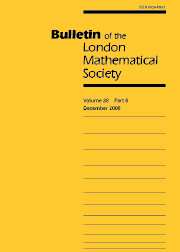Article contents
INFINITE PATTERNS THAT CAN BE AVOIDED BY MEASURE
Published online by Cambridge University Press: 01 July 1997
Abstract
A set A of real numbers is called universal (in measure) if every measurable set of positive measure necessarily contains an affine copy of A. All finite sets are universal, but no infinite universal sets are known. Here we prove some results related to a conjecture of Erdős that there is no infinite universal set. For every infinite set A, there is a set E of positive measure such that (x+tA)⊆E fails for almost all (Lebesgue) pairs (x, t). Also, the exceptional set of pairs (x, t) (for which (x+tA)⊆E) can be taken to project to a null set on the t-axis. Finally, if the set A contains large subsets whose minimum gap is large (in a scale-invariant way), then there is E⊆R of positive measure which contains no affine copy of A.
- Type
- Research Article
- Information
- Copyright
- © The London Mathematical Society 1997
- 8
- Cited by


